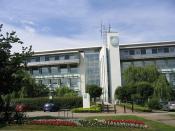In approximately 750 words, explain how 'moral panic' increases our fear of crime, using an example to illustrate your answer.
As a society, we have definite ideas of what is correct and acceptable behaviour, yet the common sense narrative (CSN) we are familiar with today tells us we are in the throes of anarchy and crime is rife. Crime is socially constructed by the legal definition of crime, the law, and the normative definition of crime, our own moral code. These definitions are the foundations of Society. Occasionally events occur seemingly confirming the CSN and we fear even more for our safety in this world of increasing instability. These events are referred to as moral panics. This essay will show how moral panic increases our fear of crime particularly focusing on the role of the media.
Moral panic, a term explored by Stanley Cohen, is not a new concept; it can be dated back as far as 1730(The Open University, 2000).
Moral panics occur when a 'condition, episode, person or group' (The Open University, 2000) draws attention to itself by acts deemed unacceptable within the community. The media exaggerate the truth, causing panic, leading to the authorities being forced to act in a severe manner.
This domino effect is linked to the deviancy amplification spiral; events are overstated by the media, encouraging further acts of deviance and a public outcry for action creating a loop before dying down until similar acts are linked to the original validating public concern. The community then questions the society where such deviancy is allowed to occur, causing worry, which is out of proportion to the evidence. Leading us to believe that society is losing all moral fibre and the youth are running wild. Each generation creates its own subcultures...


